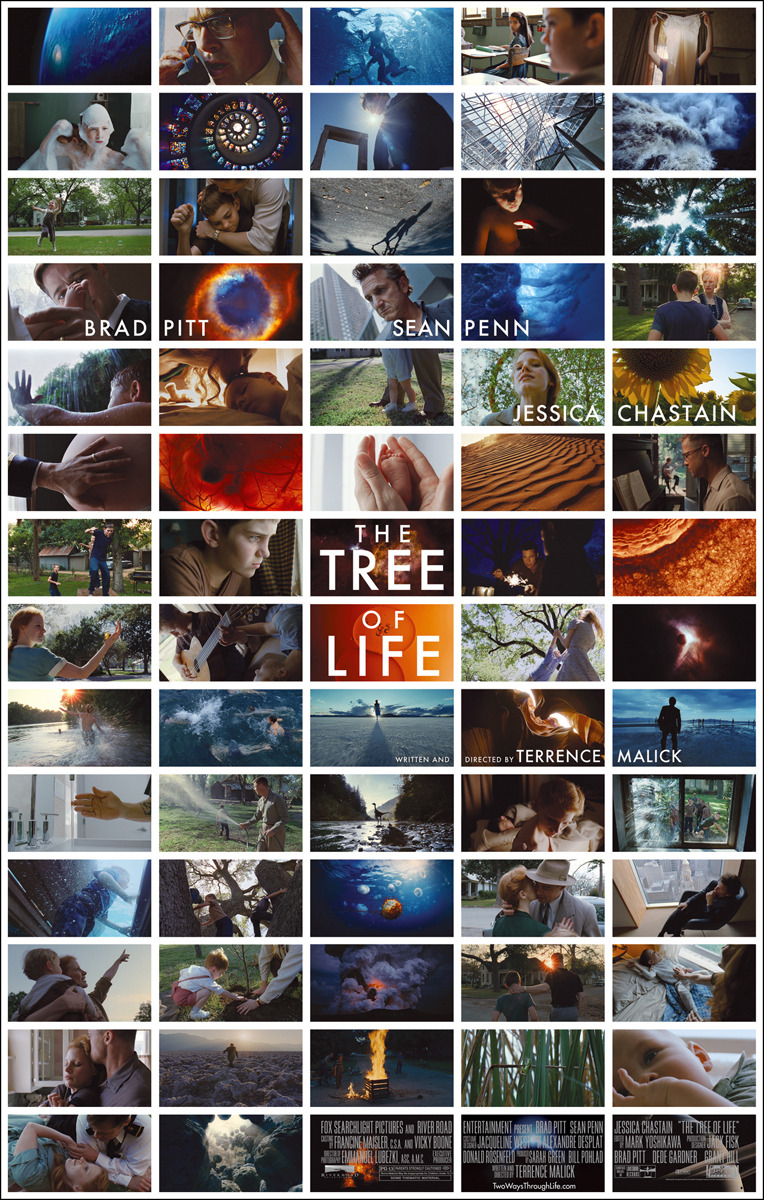I don't think I've seen such ambition
in a movie since Kubrick's 2001: A Space Odyssey. Like
2001, The Tree of Life is
bookended by seemingly unrelated, bizarre, pretentious imagery. Both
movies also make tremendous jumps through time. 2001
memorably jumps from
pre-historic humans to a space age 2001 AD, while The Tree
of Life jumps from the big bang
to dinosaurs, to the 1950s, to modern day. However, The
Tree of Life is much more of an
experimental art-piece rather the mostly coherent 2001,
which gave us a plot involving
one of film's most memorable villains in HAL 9000. The Tree
of Life tries to encompass all
of existence, and while it is beautifully shot and has mind-blowing
sound design, it comes off as pretentious because of it's deep
ambition. The film simply tries to achieve too much as a result
doesn't make a whole lot of sense.
The
film begins with a mysterious, amorphous light flickering in the
dark. A voiceover states that there are two paths to take in life,
that of grace and that of nature. We then flash forward through time.
From
the darkness the universe is born, the Milky Way, and then the solar
system form while voice-overs ask existential questions. On the
newly
formed Earth,
volcanoes erupt and microbes begin to form and replicate. Sea life is
born, then plants on land, then dinosaurs.
An
asteroid tumbles through space and strikes the Earth. We then jump to
1960s Texas. A mother, Mrs. O'Brien (Jessica Chastain) learns that
her son has been killed at war overseas. We jump ahead again to
modern day where we see Sean Penn, the now grown up brother of the
fallen soldier apologizing over the phone to his father for an
argument about his brother's death. We then jump back to 1950s Texas,
where we spend most of the movie. The O'Briens are a young family
consisting of three sons, a mother and a father (Brad Pitt). Mr.
O'Brien is a strict authoritarian, while Mrs. O'Brien is much more
gentle and loving. The two parents represent the choice between
nature and grace mentioned earlier in the film. Mr. O'Brien wants his
boys to be the best they can be, to make their own way in the wolrd,
and not fail in the same ways that he has. Jack, Sean Penn's
character as a child, become angry and resentful of his parents,
keeping a tally of his father's hypocrisies and misdeeds and lashing
out at his mother for allowing such behavior.The
film then ends with a depiction of the afterlife where Sean Penn
reunites with his family and they share an embrace.
This
film is gorgeous. I could watch it with the sound off and it would
still be entertaining, except that the sound design is also amazingly
well done. The depth of the noise we hear in each scene envelops the
viewer and makes us feel like part of the scenery. The acting is
decent, though I was surprised by how much Sean Penn is underused.
Penn is one of the greatest actors of today yet his role in this
movie is limited to just a handful of lines in about two or three
scenes. Pitt is the star for the majority of the movie. His turn as
the strict disciplinarian is very convincing. I was particularly
delighted by a scene where he is teaching his sons to fight and
encourages Jack to hit him. The scene echoed one of Pitt's most
memorable roles as Tyler Durden in the classic Fight
Club. The
film struggles with structure. It's all over the place and the
scenes bookending the main story seem to have little bearing on the
main narrative and frankly the film could have been done without
them. The beginning is particularly overlong before we get to the
main story, we just watch images of stars, planets and nebulas while
ethereal music plays and the voiceover asks existential questions
while we just sit there wondering what we're watching and when the
story will start.


No comments:
Post a Comment